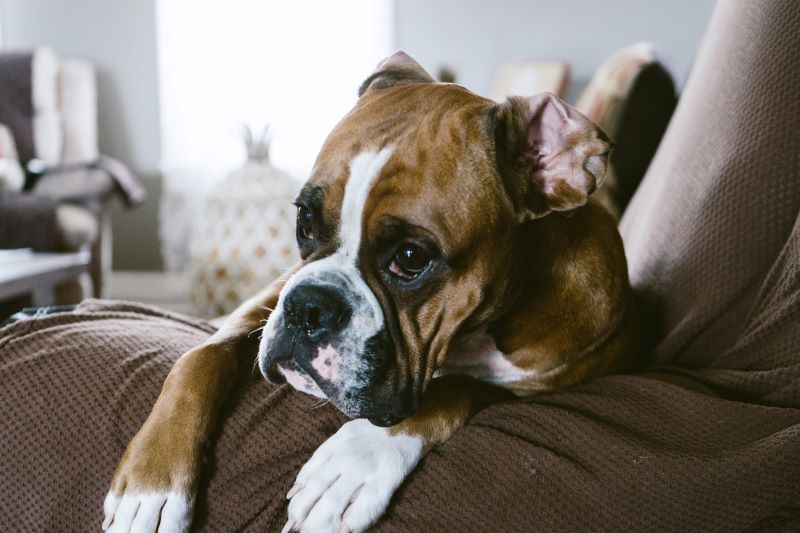Ready to help treat your pet to a healthy life?
Is Pepto-Bismol safe for dogs?
By : Trupanion Staff | Updated Nov 8, 2024
Is Pepto-Bismol safe for dogs?
By: Trupanion Staff / Updated Aug 12, 2021

Pepto-Bismol and its generic version, bismuth subsalicylate, works wonders on humans for the occasional upset stomach, heartburn, nausea and diarrhea. The over-the-counter (OTC) product is sold in pharmacies and grocery stores, and it is considered widely safe for human consumption.
As a result, many pet owners may consider giving it to their dogs, who, after all, also get upset stomachs and diarrhea. But is Pepto-Bismol safe for dogs?
What is Pepto-Bismol?
Pepto-Bismol is an oral medication used to treat gastrointestinal signs in humans, available in caplets, liquicaps, and liquid formulations. The active ingredient is bismuth subsalicylate, which is a derivative of salicylic acid, or aspirin. In the stomach, bismuth subsalicylate is broken down into bismuth oxychloride and salicylic acid.
What is the safe dose for dogs?
Pepto-Bismol can be used in dogs, but it does not suit every dog, and chronic use is not recommended. If your dog has gastrointestinal symptoms and you’re considering using Pepto-Bismol, consult your veterinarian first. Only administer the medication (or any medication for that matter) to your dog under their direction.
Pepto-Bismol side effects in dogs
Pepto-Bismol may curb upset stomach and diarrhea, but negative side effects can potentially occur in dogs. Pepto-Bismol is not usually safe for dogs, unless recommended by your veterinarian.
Bismuth subsalicylate, Pepto-Bismol’s active ingredient, can turn your pet’s stool black, which is problematic because it mimics melena (i.e., “digested” blood in the stool). Pets given Pepto-Bismol are already suffering from gastrointestinal signs, so it is important the medical team knows whether the change in stool color is due to a disease progression or a medication side effect.
Pepto-Bismol breaks down in your pet’s stomach into different components, including salicylic acid, or aspirin, which can be toxic to dogs in high doses.
Bloody vomit and diarrhea, abdominal pain, and weakness may occur in pets with gastrointestinal bleeding. Increased respiratory rate, dehydration, seizures and coma may also occur with high aspirin doses. Platelet dysfunction may cause prolonged blood clotting times.
Do not give Pepto-Bismol to pets currently taking other nonsteroidal anti-inflammatory medications for chronic conditions, such as Rimadyl or Deramaxx for arthritis. They are already at increased risk of stomach ulcerations or perforation.
Pepto-Bismol and X-rays
Pepto-Bismol tablets are radio-opaque, meaning they show up as dense objects on your pet’s abdominal X-rays. When your veterinarian investigates gastrointestinal signs, they look for gastrointestinal foreign bodies.
Dogs sometimes eat a variety of strange objects, apart from foods such as corn cobs. If your veterinarian sees that your pet, who is exhibiting gastrointestinal signs such as vomiting or diarrhea, also has opaque objects in her stomach or intestines, they may suspect that a foreign object is causing a blockage or leaking caustic chemicals.
A foreign intestinal body typically warrants invasive surgery, and a Pepto-Bismol tablet can look like a dangerous foreign object, leading to unwarranted surgical removal. Owners must always tell their veterinarian if they have given or plan to give a pet Pepto-Bismol.
What can I use instead if my dog has gastrointestinal signs?
If your dog is suffering from gastrointestinal signs, such as diarrhea and vomiting, call your veterinarian. Some situations call for oral Pepto-Bismol, but the medication is not appropriate for all dogs, and many medications, such as Pepcid (i.e., famotidine) and Prilosec (i.e., omeprazole), are safer when administered with your veterinarian’s approval.
Many gastrointestinal signs will respond to non-medical options, such as withholding food for 12 to 24 hours before instituting a bland diet (e.g., poached chicken, egg, rice, or pasta), which you should also discuss with your veterinarian.
Not all medications meant for human consumption are safe for pets.
Pet Parenting is the official blog of Trupanion, a leader in the world of pet insurance for dogs and cats. Here you’ll find useful dog and cat care tips, interesting veterinary insights, and fun pet topics galore. While you’re browsing our pet blog, please note that the views expressed here are those of the individual authors and do not necessarily reflect those of Trupanion. Articles are reviewed by veterinarians for accuracy, but they are not a substitute for professional diagnosis and treatment. Always consult with your own pet’s veterinarian for advice.

We’re always ready to help
Our customer care team is available 24/7/365.
